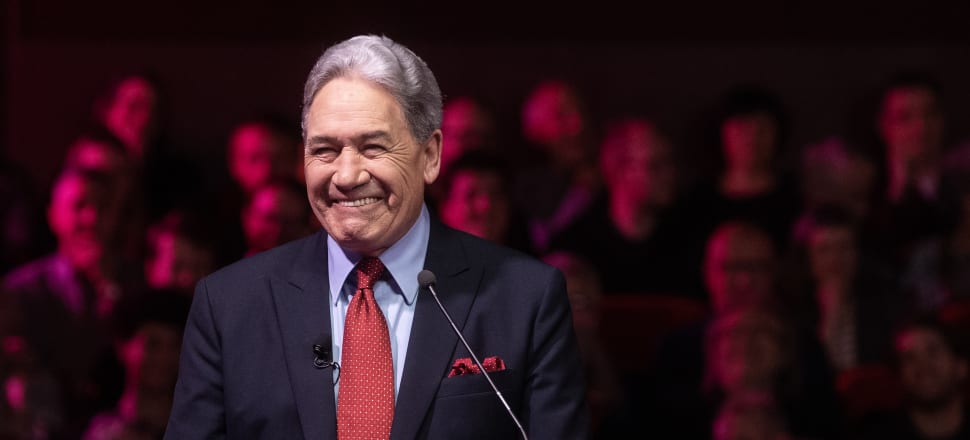
Political theatre in Christchurch lacks two main players
It was boxing but very much felt like the undercard.
Three minor party leaders, and Te Pāti Māori’s Te Tai Tonga candidate Tākuta Ferris, feigned, swayed and landed blows in Ōtautahi/Christchurch’s town hall last night, at the re-scheduled The Press leaders’ debate.
READ MORE: * Luxon’s empty Christchurch pitch * Would I lie to you? No
Given the front three rows of seats were set aside for party faithful, the crowd played a big part in the debate’s energy, especially in the first half.
The event produced news.
Green Party co-leader Marama Davidson made a direct comparison between Hamas and the Israeli Defence Force when asked about designating the Islamist Palestinian group (rather than just the military wing) a terrorist organisation.
Asked about Labour ruling out a wealth tax, Davidson said: “It is the country and the vote that gets to decide what gets prioritised on the table.”
Act leader David Seymour was questioned, again, whether his referendum on the Treaty of Waitangi was a bottom line, after calling it a mere “very high priority”. (It’s worth reading Emma Hatton’s piece for context.)
Te Pāti Māori’s Ferris quipped: “The fact that we’re talking about referendums on the Treaty just demonstrates how much more we have to learn as a country.”
On the prospect, raised by National, of a second election if no deal can be done with New Zealand First, the party’s leader Winston Peters said: “It’s just panicking, it’s scaremongering, and I can assure you right here, right now there’ll be no other early election after the 14th of October.”
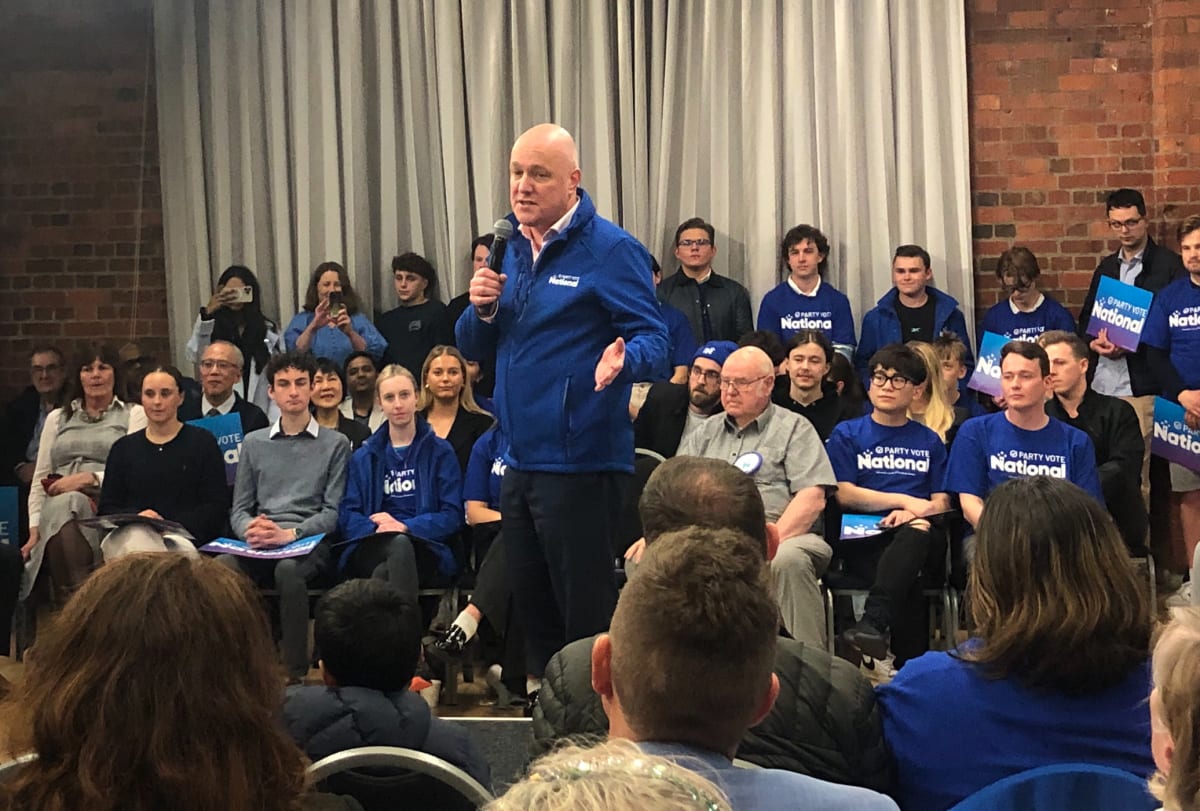
But before we cover what we got from the debate, it’s important to explain what we didn’t.
That is: two Chrises.
(Peters opened the debate with: “The other Chrises should be here, not avoiding this debate.”)
Labour leader Hipkins caught Covid ahead of the original event, scheduled for last week, and National leader Luxon said “rescheduling during the last week of the campaign has proven impossible”.
Keep that word “impossible” in mind.
As more than 1000 people flowed into the town hall last night, coats slick with strengthening rain, Luxon was addressing a National Party rally in Wellington.
The National Party leader was in Christchurch the day before, and ventured north to Rangiora where he answered questions from the media. Tellingly, perhaps, he couldn’t name a specific Christchurch policy – and for Canterbury just a road and a bridge.
Impossible might mean a calculation that there was more to lose from debating Hipkins in New Zealand’s second-largest city than could be gained. Perhaps there’s a rift with Stuff? Who knows.
To be fair to the stand-in debaters, in an election where support for the two main parties has shrunk, the minor parties seem more important than ever.
But even they hit a hurdle when asked to name a Christchurch-specific policy.
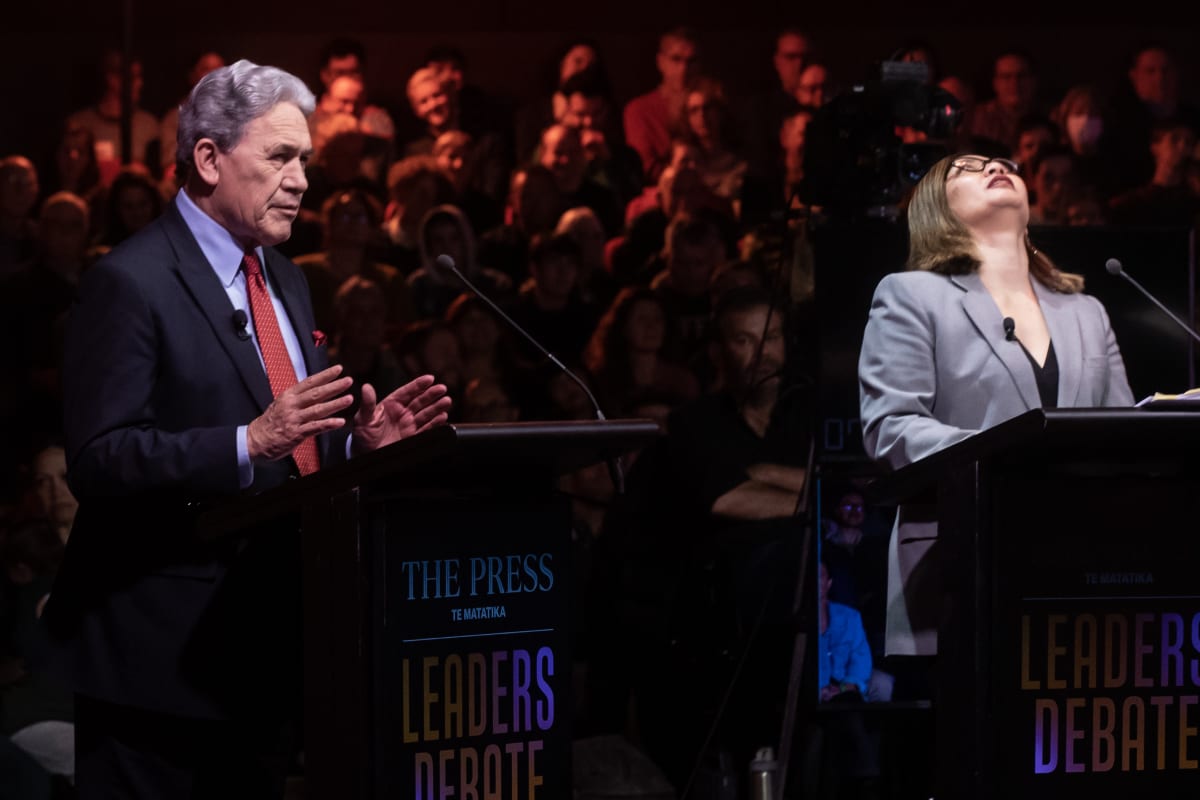
Almost 90 minutes into the debate a question from the floor asked: What policy does your party have specifically for Christchurch?
“Light rail in Christchurch,” said Davidson, the Green co-leader, referring to a $4.8 billion, 10-year plan, released in August, and paid for by scaling back plans for tunnelled light rail in Auckland.
Seymour, of Act, followed up by saying Christchurch’s challenges are similar to those in many parts of the country. “Nothing specific for Christchurch from David Seymour,” Stuff host Tova O’Brien said.
(He clarified later that meant investment in infrastructure, planning law reform, and the ability to build more homes at an affordable level. When pressed by Newsroom, he said the Greens’ light rail proposal wasn’t a good investment, adding: “If you think there’s something that is so profoundly different about Christchurch that it should have totally different policy from the rest of New Zealand you’re being a bit unfair.”)
Te Pāti Māori’s Ferris said: “GST off kai for everyone in Christchurch that needs it.”
Peters, the New Zealand First leader, started by saying finish the Christchurch earthquake rebuild – a throwaway line when many of the central city’s decisions rely on investments by developers. He added, with his trademark grin: “Get ready for the Commonwealth Games in 2026.”
Before a word had even been spoken in the debate, Peters got the first laugh.
A Stuff clip ended with a comment from Labour’s Hipkins: “Winston Peters brings chaos wherever he goes.” The New Zealand First leader extended his arms, as if to say, “Who, me?”
Later he suggested it was like water off a duck’s back,
Peters was involved in several memorable exchanges.
Asked when he last used his Super Gold Card for pensioners, the 78-year-old said: “Well, that’s private. When was the last time you went to the bank, did I ask you that? No.”
A way to make New Zealand a wealthier country, so it could better afford top quality public services, was, according to Peters: “We’ve got to get into export, export, export, but add value to the max.”
As a counter, Te Pāti Māori’s Ferris said the country had become overly dependent on internationalisation and globalism.
“As long as we’re talking about ‘export, export, export’, I can guarantee you that the people in the middle and the bottom rungs of our society will continue to fall deeper and deeper and further behind. We’re just not happy with that.”
Peters shot back, parties backing wealth redistribution were “halfway to being the new Robin Hoods”, but “they won’t be giving to the poor”.
In an exchange over the drivers of crime, Ferris questioned how connected Peters was to Māori communities today.
“Give me a break,” Peters said. “Where were you?”
Ferris: “I wasn’t born then, but ke te pai.”
Davidson asked why elite, wealthy politicians were being quizzed on their cut-backs during the cost of living crisis. Peters was happy to respond, though, saying, quizzically, carbohydrates.
Ferris was asked if Goldman Sachs thought National’s tax cuts would be inflationary, what would it make of Te Pāti Māori’s plans to give tax cuts to 3.8 million people. “They can let us know when they have a look.”
He added: “As long as the rich in this country are allowed to get away with hiding their money, building their wealth, accumulating it individually, while the vast majority of this country slip lower and lower in living standards, we will get nowhere fast.”
Peters tagged that a “pinko, communist-type approach”, saying his party’s suggested tax-free theshold of $14,000 would be delayed because of government debt.
“They’ve got a thousand ways to spend money and not one way of making it,” the New Zealand First leader intoned.
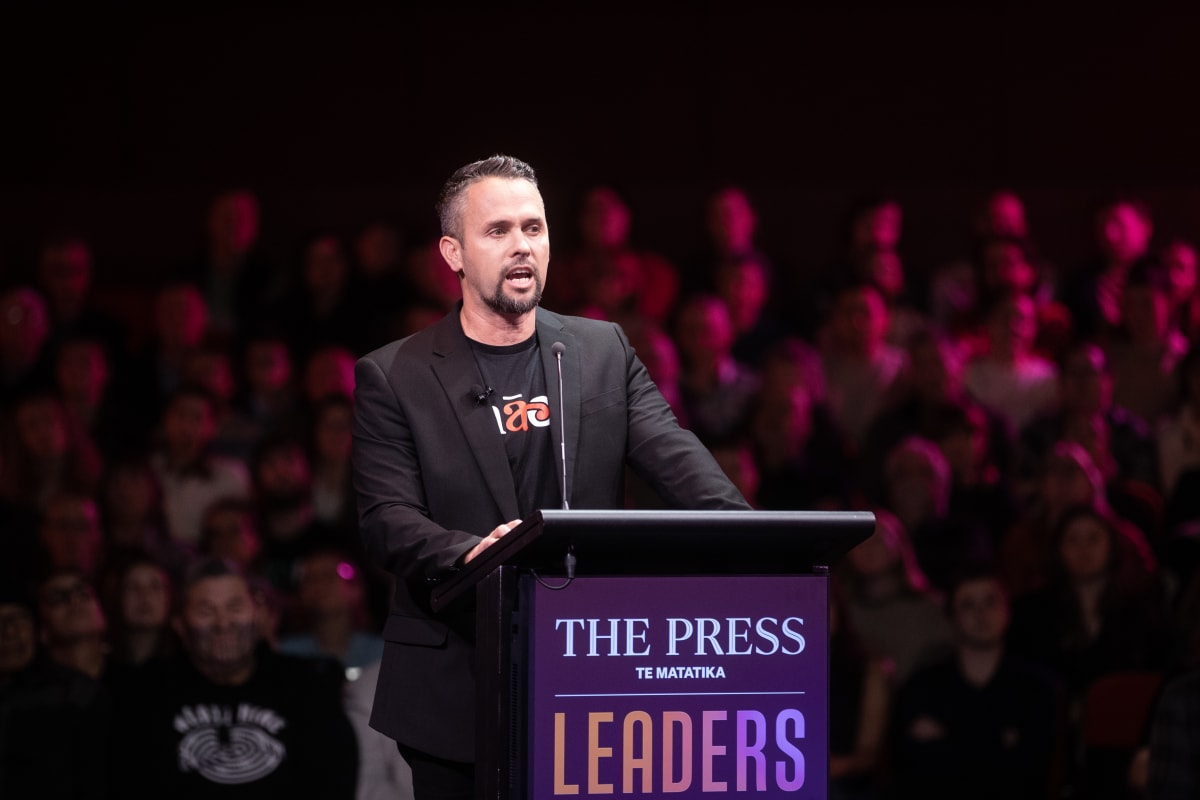
There was a powerful contrast between Seymour and Ferris’s comments on the economy, in the context of the cost of living.
The Act leader said people from all walks of life were hurting – a situation he blamed on Government spending, and excess red tape and regulations.
“What we really need to do is work together to start raising productivity, make the economy work for people, make jobs higher-paying, get more investment and innovation, so we can truly be first-world. At the moment it feels like we’re a bit middle income, and we deserve better than that as New Zealand.”
Ferris motioned at Seymour when he said Te Pāti Māori’s candidates understood what it’s like to live at the “grassroots of communities” – “and not the middle class ones he’s talking about”.
“Our people have been in poverty for generations, and putting up with slow, mediocre, incremental gains forward. It’s no longer acceptable for us.”
Māori understand the country’s economic problems, he says, pointing to its “low-value economic model”.
“We need to move to a model that’s higher in value, and we need to have more policies, more people in government, that understand what the ground looks like, instead of ideas from the middle and above.”
There was a later clash over crime and justice.
Seymour said prison capacity had to increase, youth facilities run by Corrections but separate from adult prisons, “we do need to have real consequences for people committing crime”.
“We all need to get together and get stuck in to bring back the great place to bring up kids we like to think of ourselves as living in.”
As the applause rippled, Davidson quipped: “Rubbish.”
Ferris said: “Anyone who thinks ramping up commercial prisons in this country, where 52 percent of that prison is guaranteed to be Māori, is out of their mind.”
Peters repeated his line from previous debates about having a gang-only prison, “so they can’t contaminate and recruit others”.
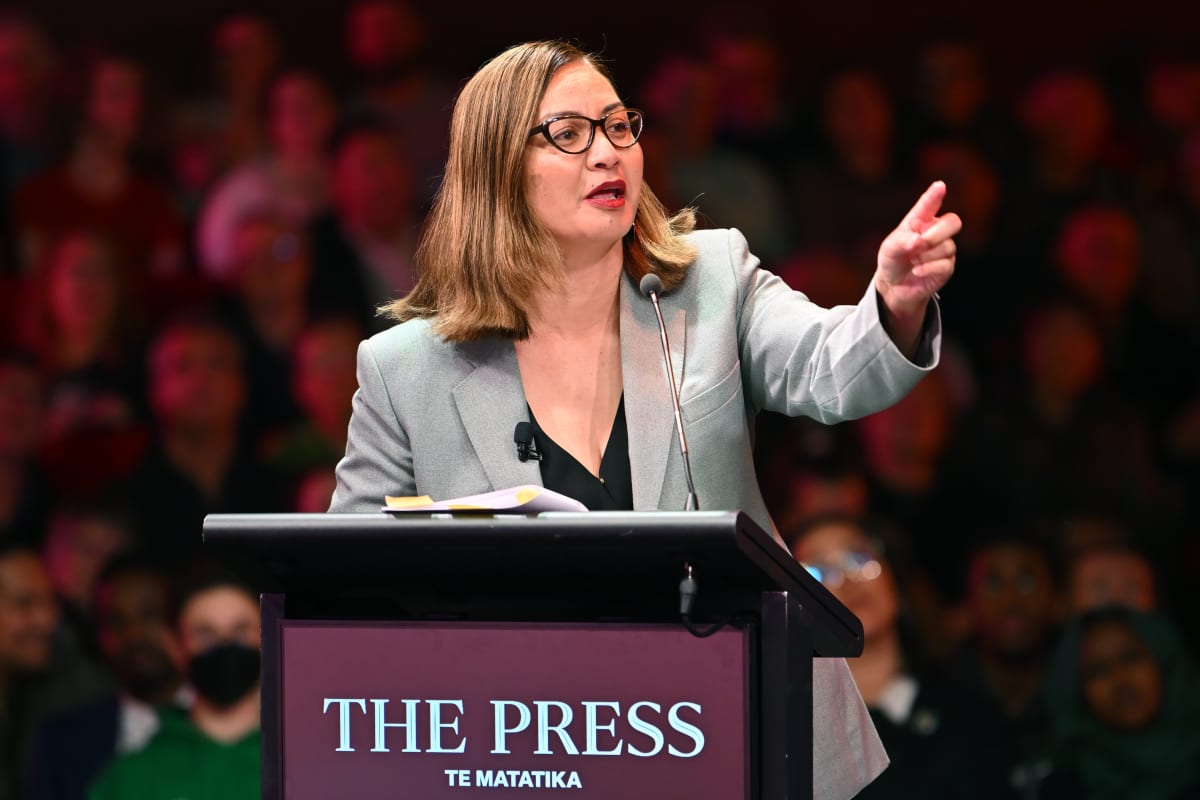
On healthcare, the Greens are promising “universal, free and accessible diagnosis, treatment and management for all illnesses and injuries”.
How is that possible, Davidson was asked, when the country’s about 8000 short of doctors, nurses and health professionals?
What’s required is pay equity and parity, she said, and for-Māori, by-Māori solutions.
“Nine months of a Māori Health Authority cannot resolve 180 years of that inequity.”
Seymour repeated his claim that inequitable treatment in the health system for Māori was “on average”, with some Māori getting better treatment than Pākehā, while some non-Maori, need more help.
People shouldn’t be “lazily and divisively grouping people by race”, he said.
Peters, who has called for a Māori Health Authority to be scrapped, said ordinary Māori don’t think they’re entitled to an operation first treatment, but “these radicals” – pointing to Ferris and Davidson – were “superior, elite Māori”.
Davidson responded: “When we highlight and make the false claim that some people are going to miss out when we rectify inequalities that have been longstanding for nearly 200 years, that is absolutely race-baiting.”
Later, the Green Party co-leader criticised Act for its wealthy donors (the Green Party took $50,000 from Hollywood director James Cameron), saying to Seymour: “Someone gave you a plane and they want something back for that, and it’s not your friendship.”
Seymour said people donate to Act not because the party says what they like but because they like what it says.
The moderators can’t escape mention.
A relaxed Tova O’Brien delivered some good lines, including asking Davidson if a guaranteed minimum income would encourage people to stay at home, “Netflix and chill”.
Political editor Luke Malpass’s questions on climate change could have been better.
To the Green Party: What is its position on gene modification, which could help to reduce agricultural emissions?
Davidson’s response: “We cannot keep falling back onto the hope for some mystical technology that is going to bring down our big emissions.”
To the Act Party: Why isn’t its proposal for a tax refund for New Zealanders from Emissions Trading Scheme revenue better spent on emission reductions?
Seymour’s response: “Everything that the Government spends money on trying to bring down emissions is actually more expensive than the carbon price set by the ETS.”
He maintained individuals make better choices than governments, even though it’s institutions like governments that are far better placed to solve major societal problems.
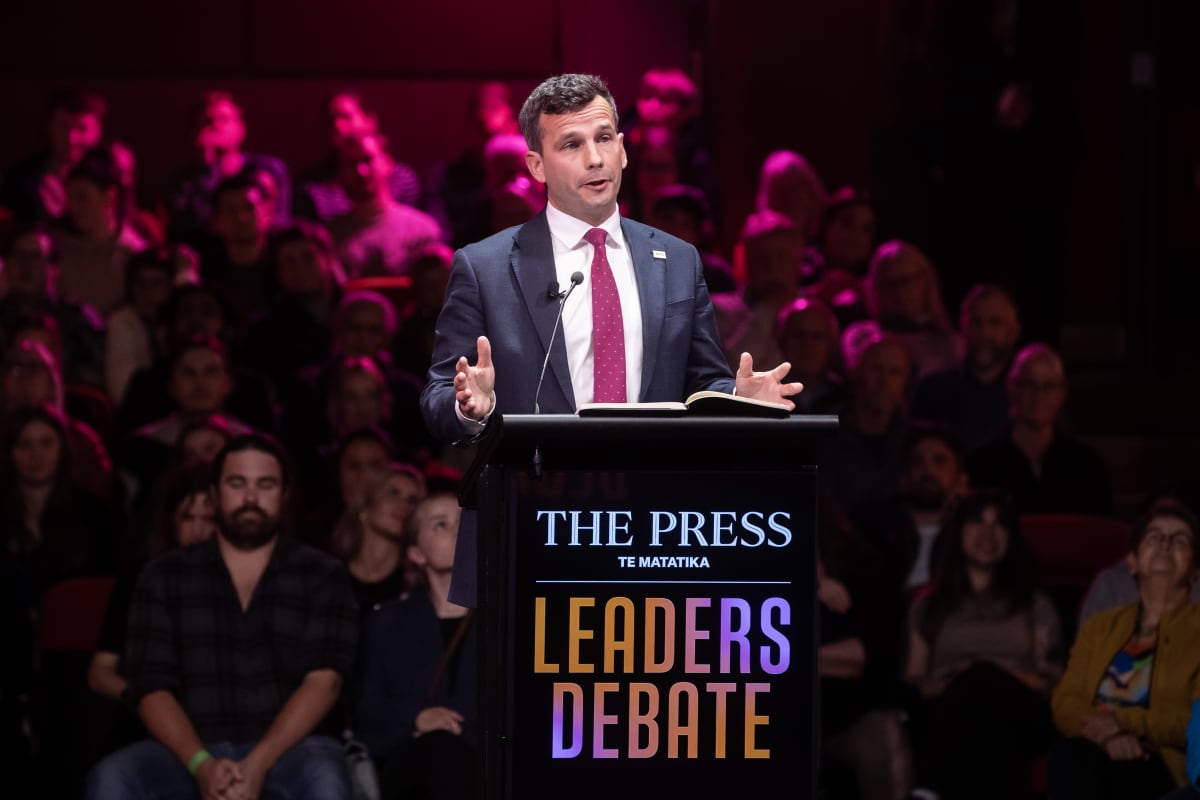
Ferris’s take was: “We have to reduce emissions, that’s it.”
Peters, meanwhile, harked back to flooding in Hawkes Bay’s Esk Valley in 1938 – a tactic often employed by denialists to suggest the climate has always changed and is therefore part of a natural cycle.
Seymour finished with: “We’ve got to stop squabbling and work together to solve these very urgent problems.”
Amen.
The advantage of being at the Town Hall debate was to see the body language, and check the candidate vibe.
A striking image was Marama Davidson looking despairingly to the sky during a Peters rant. Peters, meanwhile, would often pull a pen from his breast pocket to dutifully write notes as others spoke.
At the break, it was Peters and Ferris who spent the most time in the crowd, and were the first back to the stage. After the debate ended, Davidson immediately went to shake Peters’ hand. As she approached Ferris, Seymour went to shake hands with Press editor Kamala Hayman, and then bounded off the stage.
Seymour had the last word of the night – to your correspondent.
This journalist donned wet weather gear, and a spotlight on his helmet, in an outfit not unlike a Minion’s. Trudging towards the rain-coated door, the Act leader asked: “Are you going caving?”
If I was, I’d be heading there to find a politician called Chris.







